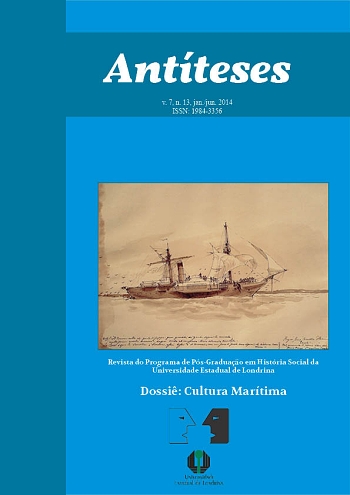Desmobilização e reintegração social das tropas brasileiras e americanas da Segunda Guerra Mundial: um estudo comparativo
DOI:
https://doi.org/10.5433/1984-3356.2014v7n13p467Palavras-chave:
Segunda Guerra Mundial, Estados Unidos, Brasil, Desmobilização, Veteranos de GuerraResumo
O objetivo deste artigo é discutir os resultados de um estudo comparativo dos veteranos brasileiros e americanos da Segunda Guerra Mundial, com respeito à sua desmobilização e reintegração social. Apesar das óbvias diferenças entre as experiências da participação na guerra entre Estados Unidos e Brasil, defendo que o estudo dessas duas maneiras de lidar com os problemas de desmobilização e reinserção dos combatentes pode oferecer novas luzes sobre vários problemas comuns a ambos os países: a relação entre as sociedades e as forças armadas, as relações entre o governo federal e os seus cidadãos, a desigualdade social e racial e, por último mas não menos importante, as experiências de construção de estruturas de Estado de Bem Estar na guerra e pós-guerra. Baseada em estudos internacionais sobre processos lidando com a desmobilização e integração social dos ex-combatentes da guerra, essa pesquisa atual selecionou as variáveis que foram decisivas para o sucesso ou o fracasso de tal uma adaptação em tempo de paz: a) experiências anteriores de reinserção dos veteranos de guerra; b) a natureza e as consequências do recrutamento para os futuros ex-combatentes; c) o planejamento do Estado e das forças armadas dos processos de desmobilização e reintegração no pós-guerra; d) a implementação de desmobilização e os impactos no seio da instituição militar e da sociedade civil causados pela reintegração de ex-combatentes à vida social e profissional.Downloads
Referências
ANGRIST, Joshua. Why Do World War II Veterans Earn More Than Nonveterans? Princeton, NJ, Working Paper 254, Industrial Relations Section, 1989.
BALLARD, James Stokes. The Schock of Peace: Military and Economic Demobilization after World War II. Washington D.C.: University Press of America, 1983.
BARCELLOS, Luciano Alfredo. "A flagelação dos ex-combatentes". In: Louzeiro, José (org.). Assim marcha a família. Onze dramáticos flagrantes da sociedade cristã e democrática, no ano do IV Centenário da cidade do Rio de Janeiro. Rio de Janeiro: Civilização Brasileira, 1965.
BEATTIE, Peter. The tribute of bood: Army, honor, race and nation in Brazil (1864-1945). Durhan: Duke University Press, 2001.
BENNETT, Michael. When the Dreams Came True. The G. I. Bill and the Making of Modern America. Washington: Brassey's, 2000.
BÉRUBÉ, Allan. Coming Out Under Fire: the history of gay men and women in World War II. New York: The Free Press, 1990.
BROOKS, Jennifer E. Defining the Peace: World War II veterans, race, and the remaking of Southern political tradition. Chapel Hill: University of North Carolina Press, 2004.
CANADAY, Margot. Building a Straight State: sexuality and citizenship under the 1944 G.I. Bill. Journal of American History, vol. 90, n. 03, p. 935-957, December, 2003.
CHILDERS, Thomas. Soldier from the war returning: the Greatest Generation's troubled homecoming from World War II. Boston: HoughtonMifflin Harcourt, 2009.
COLE, Garold. Home from the War: the popular press views the veteran problem, 1944-48. The North Dakota Quarterly. Summer 1978, 41-61.
DICKSON, Paul; ALLEN, Thomas B. The Bonus Army: an American Epic. New York: Walker and Company, 2004.
FARIAS, Osvaldo Cordeiro de. Meio século de combate: diálogo com Cordeiro de Farias, Aspásia Camargo, Walder de Goes. Rio de Janeiro: Nova Fronteira, 1981.
FERRAZ, Francisco Cesar Alves. A Guerra que não acabou: a reintegração social dos veteranos da Força expedicionária Brasileira (1945-2000). Londrina: EDUEL, 2012.
FERRAZ, Francisco Cesar Alves. As Guerras Mundiais e seus Veteranos: uma análise comparativa. Revista Brasileira de História. Vol. 28, n.56, 2008.
FERREIRA JUNIOR, Alcemar. Uma visceral rebeldia: clientelismo e isenções no recrutamento da Força Expedicionária Brasileira (1943-1944). In: SANTOS, Cláudia R. Andrade dos (et al.). Estudos - vol. II - Série Grupo de Pesquisa LEPH/Programa de Mestrado em História Social/Universidade Severino Sombra . Curitiba, 2007.
FLYNN, George Q. The Draft, 1940-1973. Lawrence: University Press of Kansas, 1993.
FRYDL, Kathleen J. The GI Bill. New York: Cambridge University Press, 2009.
GAMBONE, Michael D. The Greatest Generation Comes Home: the Veteran and the American Society. College Station: Texas A&M University Press, 2005.
GREENBERG, Milton. The G. I. Bill: the law that changed the America. New York: Lickle Pub Inc., 1997.
GRINKER, Jr., Roy R.; SPIEGEL, John P. Men Under Stress. York, PA: Blakiston Company, 1945.
HARTMANN, Susan M. Prescriptions for Penelope: literature on women's obligations to returning World War II veterans. Women's Studies. Vol 5, 1978, pp 223-239.
HOEFER, Peter D. A David against Goliath: the American Veterans Committee's challenge to the America Legion in the 50's. PhD Dissertation. Department of History, College Park: University of Maryland, 2010.
HUEBNER, Andrew J. The Warrior Image. Soldiers in American Culture from the Second World War to the Vietnan Era Chapel Hill: The University of North Carolina Press, 2008.
HUMES, Edward. Over There: how the G.I. Bill transformed the American Dream. Orlando: Harcourt, 2006
JEFFRIES, John W. Wartime America: the World War II Home Front. Chicago: Ivan R. Dee, 1996.
MARSHALL, George; ARNOLD, H.H.; KING, Ernest. The War Reports of General of The Army George C. Marshall; General of the Army H.H. Arnold; Fleet Admiral Ernest J. King. Philapelphia & New York: J.B. Lippincott Company, 1947
MAULDIN, Bill. Back Home. New York: William Sloane Associates, 1947.
MAXIMIANO, Cesar Campiani. Barbudos, sujos e fatigados: soldados brasileiros na Segunda Guerra Mundial. São Paulo: Grua, 2010.
MAXIMIANO, Cesar Campiani; BONALUME NETO, Ricardo. Brazilian Expeditionary Force in World War II. Oxford, UK: Osprey, 2011.
MAXIMIANO, Cesar Campiani; OLIVEIRA, Dennison de. Raça e Forças Armadas: o caso da Campanha da Itália (1944-45). Estudos de História. Franca, vol.8, n.1, 2001.
McCANN, Frank D. A Nação Armada. Recife: Guararapes, 1982. 1
McCANN, Frank D. The Brazilian-American Alliance, 1937-1945. Princeton: Princeton University Press, 1973.
McCANN, Frank D; FERRAZ, Francisco C. A. Brazilian-American Joint Operations in World War II, In: MUNHOZ, Sidnei; SILVA, Francisco Carlos Teixeira da (eds.). Brazil-U.S. Relations in the 20th and 21st Centuries. Maringá: EDUEM, 2013.
MELLO, José Luiz Ribeiro (org.) A legislação do ex-combatente. Rio de Janeiro: Ed. Expedicionário, 1978.
METTLER, Suzanne. Bringing the State back in to civic engagement: policy feedback effects of the G. I. Bill for World War veterans. American Political Science Review. Vol. 96, n. 2, june 2002.
METTLER, Suzanne. The G. I. Bill and the making of the Greatest Generation. New York: Oxford University Press, 2005.
OLSON, Keith W. The G.I. bill, the veterans, and the colleges. Lexington: University Press of Kentucky, 1974.
ONKST, David H. "First a Negro...Incidentally a Veteran": Black World War Two Veterans and the G. I. Bill of Rights in the Deep South, 1944-1948. Journal of Social History. Vol. 31, Nº 03, Spring, 1998.
PAIVA GONÇALVES, Carlos. Seleção Médica do Pessoal da F.E.B. Histórico, funcionamento e dados estatísticos. Rio de Janeiro, 1951.
PIEHLER, G. Kurt. Remembering War the American Way. Washington: Smithsonian Books, 1995.
PRATT, George K.; STEVENSON, George S. Soldier to Civilian: Problems of Readjustment. New York: McGraw-Hill, 1944.
ROSE, Kenneth. Myth and the Greatest Generation: a social history of Americans in World War II. New York: Routledge, 2008.
ROSENHECK, Uri. Olive Drab in Black and White: the Brazilian Expeditionary Force, the U.S. Army and Racial National Identity. XXIX International Congress of the Latin American Studies Association (2010, October 6-9).
ROSS, Davis R. B. Preparing for Ulysses: politics and veterans during World War II. New York: Columbia Unievrsity Press, 1969.
SAXE, Robert Francis. World War II Veteran's Challenge to the Post-War Consensus. New York: Palmgrave Macmillan, 2007.
SCHULZ, John. O Exército na política. Origens da intervenção militar. São Paulo: EDUSP, 1994.
SEVERO, Richard & MILFORD, Lewis. The wages of war: when America's soldiers came home. From Valley Forge to Vietnam. New York: Touchstone, 1990.
SILVEIRA, Joaquim Xavier da. A FEB por um soldado. Rio de Janeiro: Nova Fronteira, 1989.
SKOCPOL, Theda. Protecting Soldiers and Mothers. The Political Origins of Social Policy in the United States. Cambridge, Mass./London: The Belknap Press of Harvard University Press, 1992.
SOARES, Leonércio. Verdades e vergonhas da Força Expedicionária Brasileira. Curitiba: Ed. do autor, 1985.
SODRÉ, Nelson Werneck. História militar do Brasil. Rio de Janeiro: Civilização Brasileira, 1978.
SPARROW, John. History of Personnel Demobilization in the United States Army. Washington D.C.: Center of Military History/United States Army, 1952.
SPINDLER, G. D. The Doolittle Board and Cooptation in the Army. Social Forces, vol. 29, n. 3, March 1951, 305-310.
STOUFFER, Samuel, et al. The American Soldier. Volume 1: Adjustment during Army life. Princeton: Princeton University Press, 1949.
TERKEL, Studs. "The Good War": an oral history of World War II. New York: The New Press, 1984. The Health Scandal. The Nation. July 22, 1944.
VAN ELLS, Marc D. To Hear Only Thunder Again. America's World War Veterans Come Home. Lanham, MD: Lexington Books, 2001.
WALLER, Willard. The Veteran Comes Back. New York, Dryden Press, 1944.
WECTER, Dixon. When Johnny Comes to Marching Home. Cambridge: Houghton, 1944.
WYNN, Neil A. The "Good War": The Second World War and Postwar American Society. In: Journal of Contemporary History. SAGE Publications, 1996.
Downloads
Publicado
Como Citar
Edição
Seção
Licença
Copyright (c) 2014 Antíteses

Este trabalho está licenciado sob uma licença Creative Commons Attribution 4.0 International License.
A Revista Antíteses adota a Licença Creative Commons Attribution 4.0 International, portanto, os direitos autorais relativos aos artigos publicados são do(s) autor (es), que cedem à Revista Antíteses o direito de exclusividade de primeira publicação.
Sob essa licença é possível: Compartilhar - copiar e redistribuir o material em qualquer suporte ou formato. Adaptar - remixar, transformar, e criar a partir do material, atribuindo o devido crédito.
https://creativecommons.org/licenses/by/4.0/












